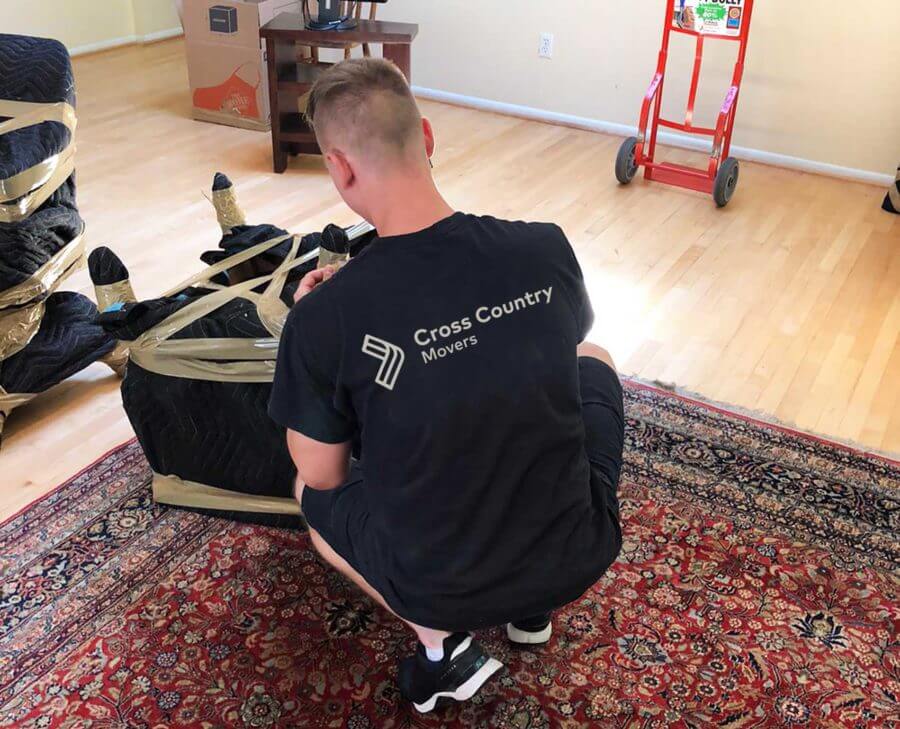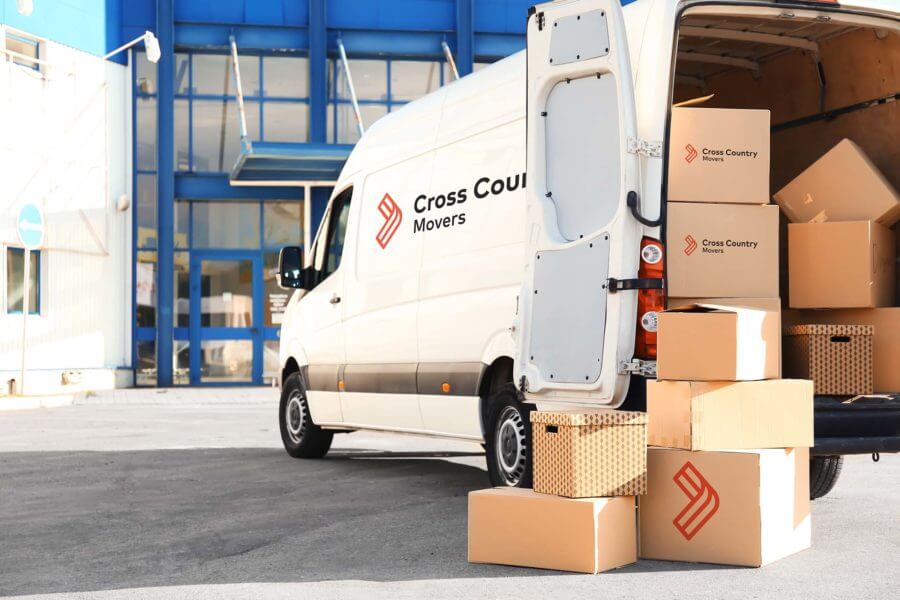

How Much Does It Cost to Move Across the Country?
Posted in Moving Essentials,Planning the Move on October 2, 2023
Embarking on a relocation brings the inevitable question to the forefront – how much does it cost to move across the country? The answer is shaped by a myriad of factors, from the volume of your belongings to the distance and moving services selected. Let’s unravel this query and provide insights on the financial aspect of relocating so you can have a move that is both efficient and cost-conscious.
How Much Does It Cost to Move Across the Country?
We can’t tell you exactly how much it costs to move cross-country as there are many factors involved, such as the distance of the relocation and the services you choose. However, cross-country relocation costs about $4,500-$7,000 on average.
Main Factors Affecting Cross-Country Move Costs
For the past few years, over 10% of the US population has embarked on relocations, which roughly translates to just over 27 million people. Embarking on a cross-country relocation is an exciting yet complex task, and each person navigates their distinct pathways with various strategies and resources.
Various factors come into play when estimating the costs associated with this significant life event. Each element contributes uniquely to the overall expense, necessitating a close examination to budget effectively.
Without an in-depth understanding, you might find hidden expenses that could have been anticipated and mitigated. In the following sections, we will explore these critical components, shedding light on how each can influence the financial aspect of moving across the country.
Assessing the Impact of Distance on Relocation Costs
The expenses of relocating increase with distance due to factors like fuel, time, and vehicle wear and tear. While different moving companies may incorporate these factors into the price differently, it’s safe to say that the farther you move, the higher the price will be.
Additional expenses, such as tolls and overnight stays for the moving crew, can also add up. The complexity of logistics and planning rises with distance, potentially incurring indirect costs, such as the need for storage services if there is a waiting period before the new residence is ready for move-in.
Choosing Between Partial and Full Packing Services
Packing services are designed to offer the flexibility to choose a solution that aligns with your requirements, belongings, and budget. Partial and full packing services operate based on an inventory list you provided to ensure that all items are accounted for and handled according to the highest industry standards.
In the case of partial packing, movers are tasked with packing up to 15 crates. This service is tailored for those looking to have only specific, often more delicate or valuable, items packed professionally, ensuring their safety during transit while keeping their expenses in check.
Conversely, full packing services encompass boxing up all items listed in the inventory. Every piece, from large furniture to everyday items, is packed with care and expertise, offering clients a stress-free relocation experience. Although this option delivers the utmost convenience, it comes at a premium price.

Mandatory and Full Value Liability Insurance Coverage
You should know that moving insurance is a pivotal aspect that ensures the safety and reimbursement of your belongings during the transit process. The type of insurance chosen can significantly impact the level of security you have for your items.
Mandatory insurance, also known as Minimum Liability Insurance, is often included at no additional charge in the moving services. It provides basic coverage that compensates up to 60 cents per pound of damaged items in the event of damage or loss. While it is an economical option, the compensation might not be adequate to cover the replacement cost of valuable items.
On the flip side, Full Value Liability Coverage offers a more comprehensive protection level. This policy compensates for the replacement value of lost or damaged items, offering a more substantial safety net for your belongings. Although it comes at an extra cost, many opt for this coverage for enhanced peace of mind, especially when relocating valuable possessions.
Handling the Relocation of Special Items
There are four categories of special items, each bringing its own set of challenges and costs. Detailed planning of your relocation and consideration of the specific handling requirements of each item listed below are essential to ensure their smooth and safe relocation. Here is a detailed look at the cost factors associated with these special items:
- Pianos – these musical instruments are not only heavy but also delicate. The costs associated with relocating pianos include specialized packing materials, skilled labor, and sometimes even additional insurance to mitigate the risks of damage.
- Antiques – given their value and fragility, antiques require special handling and packing. Expenses can escalate due to the need for custom crating, specialized relocation techniques, and enhanced insurance coverage.
- Artwork – relocating artwork involves considerations of the piece’s size, material, and value. Expenses may include custom packaging, climate-controlled transit, and insurance to cover the artwork’s full value.
- Vehicles – car shipping services involve expenses related to the mode of transport (open or enclosed trailers), insurance options based on the trailer you picked, and opting between door-to-door and terminal-to-terminal delivery solutions.

Average Cost Breakdowns – What Should You Know
How much does it cost to move to another state? The expense can fluctuate based on the factors stated above. Obtaining multiple quotes and being aware of the details included in each service offered can aid in making an informed decision that balances expenses and quality of service. Here is a detailed pricing structure for long-distance relocations, categorized according to the number of bedrooms in your home.
| Distance covered | One bedroom | Two bedrooms | Three to four bedrooms |
|---|---|---|---|
| Above 1,000 miles | $1,400 - $4,100 | $3,100 - $6,600 | $5,700 - $13,700 |
| Above 2,500 miles | $1,800 - $5,100 | $4,300 - $8,900 | $7,800 - $17,000 |
Are There Any Hidden Costs to Consider?
To mitigate and prepare for unexpected expenses, thorough research is essential. Obtain detailed quotes from multiple moving companies and ensure that all potential costs are itemized and explained. Always read the fine print in contracts to understand the scope of services and any additional fees that might apply.
Establishing an emergency fund as part of your moving budget can also be a wise approach to cushion the financial impact of unforeseen costs. Communication is key – having open and transparent conversations with your chosen moving company can provide clarity and minimize the risk of hidden costs emerging later in the process.
The Amount of Necessary Packing Supplies Can be Easily Overlooked
If you’re not getting professional packing assistance, the necessity to get adequate supplies is often underestimated, leading to unexpected hassles and expenses. The volume and type of goods being relocated dictate the quantity and variety of materials needed, from various box sizes to specialized packing materials such as bubble wrap or packing paper.
To avoid shortages, create an inventory of all items and categorize them based on size, fragility, and type to estimate your materials need accurately. However, in cases where supplies run short, household items like towels, blankets, and clothing can serve as effective substitutes for wrapping and cushioning belongings, ensuring their safety during transport without incurring additional costs.
Proper packing strategy and resourcefulness are crucial in ensuring all items are adequately protected, reducing the risk of damage during transit. Yet, all of your concerns can be mitigated if you engage with our Cross Country Movers company. We ensure peace of mind by arriving equipped with all the necessary packing supplies, eliminating the worry of running out or unexpected last-minute hassle.
Temporary Accommodation and Living Expenses
If there’s a gap between the move-out and move-in dates, or if unforeseen circumstances prolong the relocation process, securing temporary lodging becomes essential. This interim period incurs costs for accommodation and daily living expenses, including meals and transportation.
To mitigate these costs, planning and considering these potential expenses in the initial relocation budget is advised. Explore options like short-term rentals, hotels, or staying with friends or family to find a cost-effective solution that ensures a comfortable transition during the interim period.

Cost-Saving Tips for a Cross-Country Move
The following cross-country moving tips are designed to guide you through optimizing your relocation budget effectively. Following these recommendations can not only alleviate financial relocation stress but also enhance the efficiency and ease of your relocation.
Downsize Before the Move to Lighten Your Load
Keep in mind that downsizing for a move is not just about reducing physical clutter but a strategic step for cost reduction. Every item eliminated translates to less packing, lighter loads, and, consequently, lower transportation expenses.
Organizing and sorting through your belongings helps identify items that are worth keeping or no longer needed. Selling all the unused stuff in a garage sale or online platforms like Craigslist or Facebook Marketplace can supplement your budget by adding some extra cash to it.
Meanwhile, donating unwanted items to charity not only frees up space but also provides an opportunity to do something good and find a new home for items that are still in good condition. Discarding items that are neither sellable nor donatable is the final step in your decluttering process, ensuring only essential and valuable items make the journey to your future destination.
Flexible Moving Dates Can Bring You to the Off-Peak Relocation Rates
Having flexible moving dates can significantly reduce the cost of relocation by allowing you to take advantage of off-peak rates. The moving industry experiences varying levels of demand throughout the year. Spring and summer are typically high-demand seasons, leading to premium pricing.
By being adaptable with your moving schedule, you have the opportunity to book your relocation during the fall or winter or even on weekdays when demand is lower and rates are more affordable. This flexibility not only leads to financial savings but can also result in a more attentive service from the moving team.
Explore Tax Deductions Options and Save Up
Navigating the financial landscape of relocation can be alleviated by tapping into available tax deduction options. If you’re transferring or relocating for a job, there could be an opportunity to deduct certain expenses from your taxable income. It’s pivotal to acquaint yourself with the qualifying criteria with your employees to leverage these relocation benefits effectively.
Additionally, donating to charity not only simplifies the relocation process but can also yield tax deductions. Careful documentation of donated items is essential to claim these benefits, and that way, transform substantial expenses into notable savings, softening the financial impact of the relocation.

Hire Cross Country Movers for a Cost-Effective and Smooth Relocation Experience
In the intricate landscape of long-distance moving, the team at Cross Country Movers stands ready to transform your journey into a seamless experience. We are dedicated to delivering tailored cross-country moving services intricately designed to meet your specific needs while offering optimal value.
Our adept professionals blend expertise, efficiency, and care to ensure that every aspect of your relocation is handled with precision and personal attention. Don’t hesitate to contact us today and discover how we can turn your upcoming relocation into an experience characterized by ease, speed, and cost-effectiveness.
FAQ
How Far in Advance Should I Book a Cross-Country Relocation?
It’s advisable to secure your booking at least eight to twelve weeks in advance. This ensures that you have ample choices in terms of dates and services and allows for adequate preparation time for a seamless transition.
How Long Does a Cross-Country Relocation Typically Take?
The duration varies depending on the distance and specific services rendered. However, it generally takes anywhere from a few days to a couple of weeks. It’s always best to consult with your chosen service provider for a tailored timeline.
What Items Should I Avoid Packing When Moving Cross-Country?
Avoid transporting perishable goods, hazardous materials, and items of extreme personal value or irreplaceable nature. It’s also wise to carry important documents, jewelry, cash, and valuable small items with you to ensure their safety.







